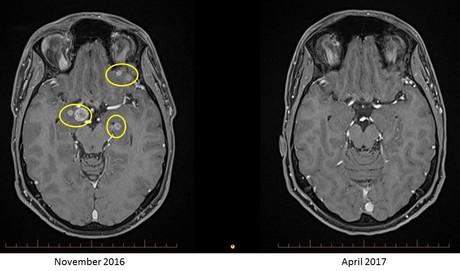Australian researchers make melanoma breakthrough

Australian researchers have achieved a major breakthrough in the fight against advanced melanoma, giving hope to over 1800 Australians expected to die from the deadly disease this year.
Researchers from Melanoma Institute Australia (MIA) are said to be the first to demonstrate that patients with advanced melanoma which has spread to the brain can have increased life expectancy and possibly even beat the disease.
MIA researchers conducted a ‘groundbreaking’ Anti-PD1 Brain Collaboration (ABC) clinical trial that involved advanced melanoma patients being given a combination of two different immunotherapy drugs: nivolumab (Opdivo) and ipilimumab (Yervoy).
Results from an early analysis of this trial show 79% of advanced melanoma patients with brain metastases treated with the combination immunotherapy were still alive at six months. 66% of those who got nivolumab alone were also alive after six months.
Typically, patients with active brain metastases survive only four to five months and never even used to be admitted to clinical trials because their prognosis was so dire. Australian researchers are the first to demonstrate that patients with advanced melanoma which has spread to the brain can have increased life expectancy and possibly even beat the disease.
“This is an absolute game changer for how we treat patients with advanced melanoma which has spread to the brain. It provides new hope to the 1800 Australians expected to die from melanoma this year,” said Professor Georgina Long, the study’s chief investigator, Conjoint Medical Director of Melanoma Institute Australia and Chair of Melanoma Medical Oncology and Translational Research at The University of Sydney.
“Quite simply, having brain metastases is no longer a death sentence,” she said. “We can now offer additional years of life and also the hope of ultimately beating this disease to a significant number of people.”
The promising results from a clinical trial developed and run by investigators at Melanoma Institute Australia are being presented in Chicago at the world’s largest oncology conference, the American Society of Clinical Oncology (ASCO) Annual Meeting, attended by more than 30,000 delegates from around the world.
In February 2016, Australia approved the use of nivolumab for advanced melanoma patients as a standalone treatment or in combination with ipilimumab.
However, patients with brain metastases were excluded from previous clinical trials, including the ones that led to the drugs’ approval. This was what prompted MIA to develop and run the world-first ABC trial. “I have melanoma patients with brain metastases who would not be alive today if they had not participated in this trial,” Professor Long said.
The study also examined patients who had no previous drug therapy prior to joining the trial, and those who received previous targeted drug therapy which is effective in patients with BRAF mutations in their melanoma. It found that the combination of nivolumab and ipilimumab was more active in patients who had not received prior targeted BRAF-directed drug therapy.
Under the current Pharmaceutical Benefits Scheme (PBS) in Australia, doctors are restricted in the order in which they can prescribe the targeted BRAF-directed drug therapies and immunotherapy as treatments for melanoma. The restrictions make it very difficult to give immunotherapy first to patients who have the BRAF mutation in their melanoma (approximately 40% of all melanoma patients).
However, this new research strongly suggests that immunotherapy should be the first-line treatment in suitable patients, in particular, those with brain metastases.
Long COVID abnormalities appear to resolve over time
Researchers at UNSW's Kirby Institute have shown that biomarkers in long COVID patients have...
RNA-targeted therapy shows promise for childhood dementia
Scientists have shown that a new RNA-targeted therapy can halt the progression of a specific type...
Parkinson's alters emotion-related bodily sensations
People with Parkinson's disease were found to have significant differences in all bodily...







